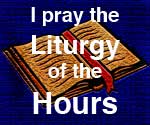Mel wrote in a comment below:
Here's a question I hadn't considered before, re: abuses in Luther's day. If during the years since then, so many "reforms" have occured, then was that church or today's church any less than the original? (hope that doesn't ramble too much) Is the essence of the church the same but some immoral behaviors or other abuses that made some reforms necessary? Is anyone trackin' with this line of thinking?
My response would be as follows, but it would really help to go look up some discussion of exactly what these abuses were and how they were "reformed". I'm going to give you the basics as I see them, then I want to address her second question in a little more detail.
First, we need to realize that the abuses that Luther touted as Church teaching were never the actual teaching of the Catholic Church. There were some priests who were corrupt (as there are now, and as there always have been, always will be, and are in every religion and job that there is) and these men made bad and sinful decisions, sometimes motivated by greed, and sometimes tricked others into thinking they were buying salvation through the use of indulgences (what many people will talk about when they talk about Luther.) Luther points this out, but exaggerates the extent and fuzzies up the true teaching of the Church on the issue. Instead of working from within to try and help these people or fix the abuses that indiviudals were doing, he chose instead to introduce schism into the Church - a terrible idea that resulted in the fragmentation that harms Christianity so much today. Even he himself regretted the results of his teaching.
Luther further perverted the truth by teaching certain false and heretical doctrines, and perverted the true history of the Church by insinuating things like the so called "Deutero-canonical books" were added later by the Church, when in fact they had been used consistently by the Church since the canon was set in stone in about 400 A.D., and had been used by the early Christians extensively, and especially by both Christ and St. Paul. These and other things that Luther taught attempted to blur the lines between real Catholic teaching and what Luther termed as abuses, many of which were either not wide spread or were total fabrications.
Enter the Church Councils who decide that some reformation is necessary. What these councils did was try to reign in on individual abuses within the Church, and make sure that the Church was staying true to its sacred Tradition. Neither the Church at that time nor the Church today is any more or less the original than it has been. They are both the only Church which is marked by the four marks of the true Church- One, Holy, Catholic, and Apostolic.
We also need to mention two other Catholic ideas that help us understand how we might think very differently about the question you ask than Protestants normally would. First is the idea of discipline versus Faith and Morals. Many Catholic teachings are disciplinary issues - when to fast, when priests are allowed to be married or not married, even what day is required for worship. These ideas can change over time (many priests used to be married in the Early Church but now Latin Rite priests cannot be married in most cases but Eastern Rite Priests can) and can develop. That is because they are not part of the Faith and Morals set forth by the Church. These things do not change over time, but are guarded from error by the Holy Father and the Magisterium of the Church.
That brings us to the idea of "Doctrinal development" - the fact that we can understand and more clearly define issues of Faith and morals as time goes on. This does not mean that the ideas change by their nature, but rather that we understand them more fully. Easy examples of this are the idea of the dual nature of Christ, the Trinity, the Canon of Scripture, etc. etc. These things were not clearly defined or maybe even understood by the early Church, but they have always been the same and the roots of these ideas are seen as early as Christ's teachings. We think of these doctrines as flower buds. Think of a flower as it is closed in the bud, then imagine it as it opens up and begins to flourish as a flower. It is exactly the same object, but once it is opened up, the full splendor of it is realized. That is how doctrinal development works, so that over time we can get a more full and understanding sense of the beauty of certain issues of Faith and Morals, while their essence goes back to the beginning of the Church.
Thus, unlike many Protestants, Catholics are not seeking to be "Exactly like the New Testament Church" because part of the beauty of Christ's Church is that as a living body it is able to grow into a fullness that was not realizable at that time. As he said, it starts as small as a mustard seed and grows into a tree so large that the birds nest in its limbs. That's a good way to think about how the Church grows and matures into something much more beautiful as time goes along while still being the same thing.


